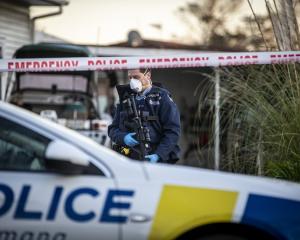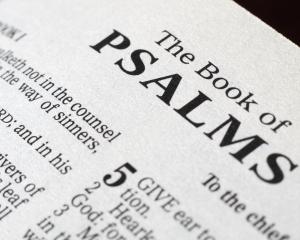Subjected to a seemingly never-ending succession, yea onslaught, of wearying, wearing, grinding misery and heartache visiting the lives of not only "those folks over there" in some far-flung corner of the globe but of those close to home - maybe even "you and yours" - the question rises like the proverbial phoenix from the ashes: "How can a 'God of Love' allow such suffering in our world - and then some?"
"How indeed?" you echo, with a tone of sarcasm laced with incredulity in your voice. And so, four and a-half weeks after February 22nd's devastating quake, you perhaps found yourself echoing the sentiments of Christchurch Cathedral's Dean Peter Beck, who, responding to Close Up's Mark Sainsbury following the special commemoration service held in Christchurch's Hagley Park, claimed what had happened was not, nay it was anything but, an "act of God".
This, of course, being the rather infamous, loaded term coined by insurance companies worldwide to characterise or categorise those catastrophic events commonly termed "natural disasters", which are otherwise all but inexplicable, strike totally unexpectedly and leave devastation in their wake.
And thus encompassing what took place on February the 22nd, 2011 - as opposed to September 4th, 2010 - in view of the oft-cited miracle of the complete lack of fatalities in that initial earthquake.
So why is the term so fraught with infamy?
"Act of God" none-too-subtly conveys the tacit acquiescence, if not the outright endorsement or stamp of approval, for ill - of an All-Powerful (supernatural) Being.
And thus signals That Omnipotent One's guilt by implication.
This "Entity", of course, is One to Whom (or Which) we have "all" grown accustomed through the ages (of whatever civilisation or culture) to define in such terms as deity/God/the gods/the supernatural/Providence/ Fate/Good or Bad Fortune/Mother Nature. Except, naturally enough, those of the Skeptics Society (and their fellow true unbelievers).
And so a predictable quandary confronts us: the apparently random deaths typically and inextricably connected with such events invariably show no real, finely attuned distinction - that is, none at least we can readily discern - between "good" and "evil" (or, say, "innocent" and "guilty") parties that we almost intuitively associate with the very idea of divine intervention in human affairs.
Not that in relation to the recent tragedies in Canterbury and Japan in particular we even have the remotest inkling of what would constitute such evil/guilt or, for that matter, good/innocence of said humanity.
No, in the circumstances, such apparently arbitrary determinations not only appear quite suspect - revealing a judgemental attitude - but frankly seem well out of our reach. And anyhow, few of us have any desire or inclination even to "go there". We all too readily realise that "there but for the grace of God (or Providence /Mother Nature) go [we]".
Indeed, we are more likely to conclude, based upon our limited human understanding, that, if a supernatural being of such exceptional power and malevolence to folks both at home and abroad were in fact involved, loathing and outrage rather than love and adoration would be our instinctive response.
As comedian Gary McCormick expressed it in his poem 22-2-2011 - written when he was "angry, angry, angry" soon after the quake: from simply being a snake "crawling into town on [its] spineless spine", "Giving us a flick, looking us over", "Checking us out" while "[it] waited", biding its time, on the 4th of September last; come February the 22nd, it fully unleashed its "venomous tongue", "whip[ping] up a blind alley full of hatred and dark breath", having transformed itself into a "miserable, low-life bastard".
Yes, that Selfsame Being might more rightly be deemed both completely arbitrary and exceedingly cruel. Curiously enough, the very sorts of attributes that some prolific Christian writers of the previous half century or three (such as C.S. Lewis in his The Problem of Pain and Ellen G. White in her Steps to Christ) have suggested Satan/the devil has sought to impugn the character of God.
And thus, ironically enough, investing "Him" with the very worst aspects of his own fiendish nature. That is, for those maintaining a belief in the existence and malevolent agency of a literal personification of evil; admittedly very few in our modern, sophisticated era.
As Peter Beck has well put it, if there have indeed been any "acts of God" associated with the earthquakes and worse plaguing Canterbury and Japan, they have been the rare display of "true humanity" these disasters have brought to the fore, and to our collective attention: the many acts of kindness, compassion and sheer empathetic love, and, moreover, the admirably selfless manner in which these have been expressed by all manner of individuals and groups - locally, nationally and internationally.
In focusing on such virtuous displays of human brotherhood and sisterhood, we must necessarily forgo for the present the vexed but ever-intriguing question of whether the truest manifestation of humanity is when it is most virtuous (rather than most beastly), though going back through some pitch-black chapters in human history, one doesn't have awfully far to look to conclude that that history is a rather mixed review at best.
Yet I, for one, can only concur with Peter Beck that we are certainly acting most like God - and hence at our most "God-like" - when we manifest such qualities, and hence are engaging in real "acts of God" indeed.
To give the good dean the last word, as Peter Beck asserted with National Radio's Noelle McCarthy on Sunday, July 3: "[God's not] some sort of [cosmic] puppeteer. As I've said often, '[this] planet is as this planet does'. Where was God? God is in the actions of people ... in our reaching out to other people ... in our ultimately being human ... love is the lifeblood of the universe."
• David Bernhardt was born in Christchurch and is a regular visitor to the city. He lives in Dunedin.












